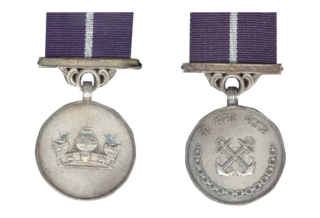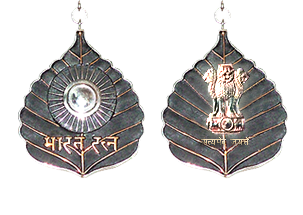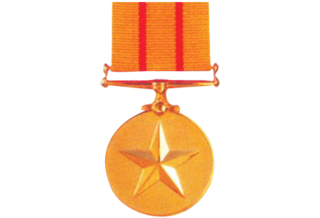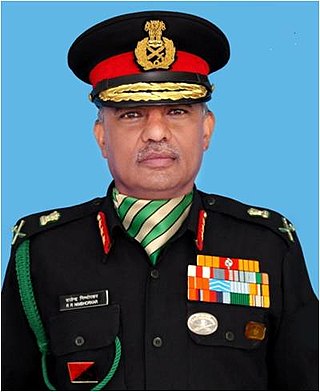
The Sena Medal is awarded to members of the Indian army, of all ranks, "for such individual acts of exceptional devotion to duty or courage as have special significance for the Army." Awards may be made posthumously and a bar is authorized for subsequent awards of the Sena Medal.

The Yudh Seva Medal is one of India's military decorations for distinguished service during wartime. It is awarded for a high degree of distinguished service in an operational context, which includes times of war, conflict, or hostilities and may be awarded posthumously.

The Vayu Sena Medal is a military decoration, usually awarded in peacetime for a job well done in the Indian Air Force. However, it has been granted during times of conflict for acts of gallantry in the face of enemy, though not in the same numbers as the Vir Chakra.

Nau Sena Medal is a gallantry award for servicemen in the Indian Navy.

The Indian honours system is the system of awards given to individuals for a variety of services to the Republic of India. The categories of awards are as follows:

The Vishisht Seva Medal (VSM) is a decoration of the Indian Armed Forces. It is awarded to recognize "distinguished service of a high order" to all ranks of the Indian Armed Forces.

Param Vishisht Seva Medal (PVSM) is a military award of India. It was constituted in 1960 and since then it is awarded in recognition to peace-time service of the most exceptional order and may be awarded posthumously. All ranks of the Indian Armed Forces including Territorial Army, Auxiliary and Reserve Forces, Nursing officers and other members of the Nursing services and other lawfully constituted Armed Forces are eligible for the award.

The Sarvottam Yudh Seva Medal is India's highest wartime distinguished service decoration. It is awarded for the highest degree of distinguished service in an operational context, which includes times of war, conflict, or hostilities. The award is a war-time equivalent of the Param Vishisht Seva Medal, which is India's highest peacetime distinguished service decoration.

Uttam Yudh Seva Medal is one of India's military decorations for Wartime Distinguished Service. It is awarded for a high degree of distinguished services in an operational context. "Operational context" includes times of war, conflict, or hostilities. The award is a wartime equivalent of Ati Vishisht Seva Medal, which is a Peacetime Distinguished Service decoration. Uttam Yudh Seva Medal may be awarded posthumously.

Lieutenant General Dr. Konsam Himalay Singh PVSM, UYSM, AVSM, YSM is a former Lieutenant General of the Indian Army. He is the first officer from northeast India to reach the rank of Lieutenant General in the Indian Army and the first military officer from Manipur to reach the ranks of Brigadier and Major General. He was the Chairman of Manipur Public Service Commission and is currently a member of the Consultative Committee of Manipur Government on Naga Peace Talks as well as a visiting faculty member of Manipur University.

Vice Admiral Pradeep Chatterjee, PVSM, AVSM, NM, ADC is a former Flag Officer in the Indian Navy officer. He served as Deputy Chief of Naval Staff of the Indian Navy from 29 May 2012 to 31 May 2014 before serving as Commander-in-Chief, Andaman and Nicobar Command.

Lieutenant General Om Prakash, PVSM, UYSM, AVSM, SM is a retired General of the Indian Army. He was the commander of the XV Corps in 2012.
The Sainya Seva Medal is a medal of the Indian Armed Forces. The medal is awarded in recognition of non-operational service under conditions of hardship and severe climate in specified areas.

Lieutenant General Devraj Anbu, PVSM, UYSM, AVSM, YSM, SM, ADC is a retired Indian Army general who served as Vice Chief of Army Staff (VCOAS). He assumed office on 1 June 2018 following the retirement of Lt Gen Sarath Chand, and retired on 31 August 2019.

Lieutenant General Deependra Singh Hooda, PVSM, UYSM, AVSM, VSM & Bar, ADC is the former General Officer Commanding-in-Chief of the Indian army's Northern Command. The General Officer was the Northern Army Commander during the 'surgical strike' in September 2016. He is most prominently known for his views on Kashmir with a strong emphasis on human rights. With a career spanning forty years, he has served on both the Northern and Eastern borders of India.

Lieutenant General R Gopal, UYSM, AVSM, SM is a serving General Officer in the Indian Army. He retired as the Quartermaster General of the Indian Army. Previously, he commanded III Corps.

Lieutenant General Rajendra Ramrao Nimbhorkar, PVSM, UYSM, AVSM, SM**, VSM is a former officer of the Indian Army who served as the Master General Ordnance (MGO). He assumed office on 9 August 2017 after Lieutenant General Ravi Thodge retired. He was part of one of the strike corp which was responsible for carrying out three strikes inside POK in Surgical Strikes held in 2016 by the Indian Army to clean out all the Pakistani Terrorists Camps. As surgical strikes were carried out very secretly to maintain surprise, so very few people knew of them, one of those involved was Lt. Gen. Nimbhorkar.

Lieutenant General Harinder Singh PVSM, AVSM, YSM, SM, VSM, is a retired General Officer of the Indian Army. He retired from Indian Army after serving as commandant of Indian Military Academyin his last appointment. Previously, he was the Commander of XIV Corps from October 2019 to October 2020, succeeding Lt Gen Yogesh Kumar Joshi, PVSM, UYSM, AVSM, VrC, SM, ADC.

Lieutenant General Gurmit Singh is a former Deputy Chief of the Indian Army. In 2021 he was appointed Governor of Uttrakhand.

The Videsh Seva Medal is a service medal of the Indian Armed Forces. It is presented to all ranks of the three services for services rendered outside India. It was instituted on 26 January 1960. It can also be awarded posthumously.



















